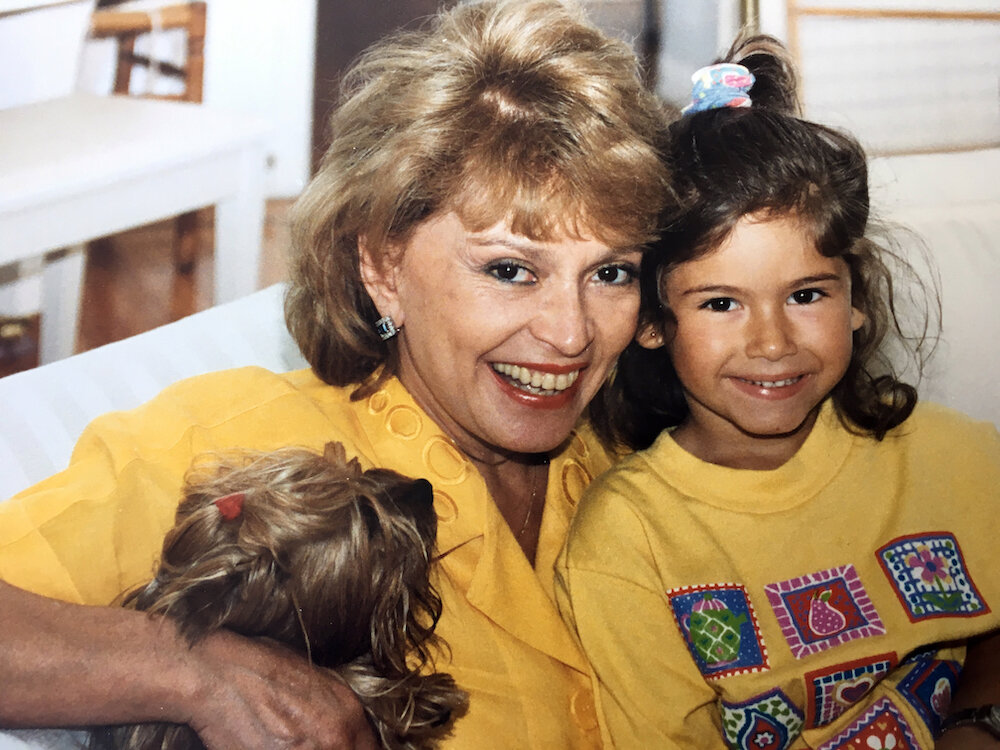Recovering American and Puerto Rican Narratives from the Caribbean
Photograph: Family portrait, 4 generations (left to right), Lt. Col. Juan Vázquez, his wife Carmen Torres de Vázquez, daughter Carmen Vázquez, Lt. Col. Juan Vázquez’s mother Isabel Berríos, and newborn grandson Keyvan Antonio Heydari, in Naranjito, Puerto Rico, circa 1964. Courtesy Keyvan Heydari. Image subject to copyright laws.
CONSERVATION & CAPTURE
Grant year: 2020
Grant category: Al Larvick National Grant
Grant recipient: Keyvan Antonio Heydari
Collection title: Recovering American and Puerto Rican Narratives from the Caribbean
Primary maker(s): Lt. Col. Juan Vázquez Berríos, Carmen Vázquez
Original format: 8mm and Super 8 film, black and white, color, silent VHS and Hi-8 videotape
Circa: 1940-1980
Collection size: Approximately 2900ft, equaling 10 reels of film; approximately 20 videotapes
Grant support: Cleaning and repair and digital capture of the entire film-based collection
Digital capture format: Scanned at 2k resolution
Lab: Pro8mm, Secure Media Transfer
Status: Conservation and digital capture completed
Online Access: Coming soon
Creative Commons License: Attribution-NonCommercial-ShareAlike 4.0 International: http://creativecommons.org/licenses/by/4.0/
GRANTEE
Photograph: Keyvan Heydari, Miami, Florida, 2018. Courtesy Keyvan Heydari. Image subject to copyright laws.
Keyvan Antonio Heydari is a reporter who grew up in Puerto Rico and the United States. His work has appeared in the Washington Post, New York Times, NPR, L'Equipe, and Slate, among others and he worked for the Miami Herald and Univision.
Keenly interested in sport and preserving oral histories, Keyvan has covered news, hurricanes and ten World Cups and Olympic Games. He contributed the hurricane scenes in the documentary "Aquarela," about water around the world, and contributed to "Diego Maradona" the documentary by Asif Kapadia of the Argentinian soccer player.
He has made several documentaries, and is now working on ‘"Sporto Ricans: fighting for the people" a documentary on how athletes have defined identity and values for Puerto Ricans. He is the grandson of Lt. Col. Juan Vázquez Berríos.
Newspaper clipping: Lt. Col Vázquez (left) with U.S. Army brass, San Juan, Puerto Rico, 1947. Courtesy Keyvan Heydari. Image subject to copyright laws.
filmmakerS
Photograph: Lt. Col. Juan Vázquez Berríos, San Juan, Puerto Rico, circa 1965. Courtesy Keyvan Heydari. Image subject to copyright laws.
Lt. Col. Juan Vázquez Berríos acquired an 8mm camera and used it to film the Army officer's club and quotidian and family life in San Juan, Puerto Rico. Vázquez Berríos, born in the mountain town of Naranjito, Puerto Rico, enlisted in the U.S. Army in 1921 and received the distinction and assignment to be Franklin Delano Roosevelt's constant attaché on the former president's visit to the island in 1934. Lt. Col. Vázquez was later deployed with the storied 65th Infantry Regiment in the Korean War.
Carmen Vázquez is the daughter of Lt. Col. Juan Vázquez Berríos. Decades later after her father filmed his experiences, Carmen became custodian of the collection and also began to record family and daily life in Puerto Rico - be it in the mountains or capital city in the 1970s, showing how the island's culture shares the legacy of Latin America, but is also part of the United States' narrative. Puerto Rico is a combination of American culture superimposed upon a society of Spanish traditions.
Photograph: Carmen Vázquez, Miami, Florida, 1992. Courtesy Keyvan Heydari. Image subject to copyright laws.
The Vázquez family lived in several locations in Old San Juan - where both Carmen and Dennis Vázquez were born - and for a time, in a house inside the XVIth Century Spanish castle of San Cristóbal, and grew up in the fortifications.
"My father had a movie camera, I don't remember the brand, one of the first in Puerto Rico. We were born in the Army hospital in San Juan. The castle was our playground and we played in the castle walls and tunnels inside San Cristóbal, which tourists now visit. One of the family movies you see, shows me and my brother playing in the late 1940s and early 1950s," recalls Carmen Vázquez. "The collection also shows family life in the beaches and mountains of Puerto Rico and also military life for the island's families." ~ Carmen Vázquez
Carmen studied music theory at Duquesne University in Pittsburgh, Pennsylvania and is an opera singer. Additionally, ‘Carmencita' danced Flamenco at Old San Juan two nights a week in the 1970s while holding a full-time job. She was featured on the cover of the 'what to do in San Juan' guide.
Periodical cover: Carmen Vázquez featured Flamenco dancer, San Juan, Puerto Rico, circa 1971. Courtesy Keyvan Heydari. Image subject to copyright laws.
THE COLLECTION
TThis media belongs mainly to the Vázquez family. Much of the footage was captured by Lt. Col. Juan Vázquez, and his family. He acquired movie and photo cameras during his military career and on the way to the Korean War, where he was a commander with the Korean Military Advisory Group (KMAG). He had also been with the decorated Borinqueneers (65 de Infantería) regiment, and then returned to Puerto Rico.
His was one of the first citizen movie cameras on the island. Lt. Col. Vázquez was given the honor of being the translator and liaison for President Franklin Roosevelt when he visited Puerto Rico in the 1930s. There are Army brass and political figures in the material. His son Dennis Vázquez also served in the Army, specifically in Vietnam and he testified in the My Lai trial. Carmen Vázquez is the family historian and has done a good job of archiving and preserving the media, and over generations added to the collection.
Photograph: Carmen Torres de Vázquez poses son Dennis Vázquez, 1960. U.S. Army Sergeant Vázquez, born in San Juan, was an artilleryman deployed to Vietnam and testified in the MyLai trial of Lt. Calley. Courtesy Keyvan Heydari. Image subject to copyright laws.
The recorded media reflects cultural and historic significance in the Caribbean and the mainland. U.S. Army families in Puerto Rico in the 1940s, the Army's Fort Brook in San Juan, Fort Buchanan, Korea and more (8mm). These portray San Juan before it was developed fully. Also, of the Latino experience in the U.S. as families moved to the States. They portray family life, music, culture and sport of Puerto Rican families - stateside and on the island - which show the dual language, culture of the U.S. citizens of Puerto Rico.
There are images of the present-day clearing between El Morro and San Cristóbal, a tourist hot spot which was Rodríguez Army Hospital, named for the Puerto Rican dentist who discovered the bacteria which causes caries/cavities while with the U.S. Army. Carmen and Dennis Vázquez were born there.
Cassette and video recordings also exist, which show the sports history of the island and mainland. American influences, culture and troops, and contributions have come via Puerto Rico. But it's been a two-way street. because the American influences and contributions include baseball, basketball, American cars, lifestyle and products. And there's evidence of the dual influence of Spain and the United States on Puerto Rico's history, architecture and life.
But the lone U.S. territory that speaks Spanish has also made sizable contributions to life, history and culture in the United States. There's military documents, photos and negatives, audio and video recordings, films and videotapes. Included are street scenes, sports events, family scenes, military installations, 'fiestas' and iterations of "Bomba y plena," improvisational music genres from the island, a form, which fed rap in New York and later influenced the creator of Hamilton [the musical].
Photograph: Carmen Vázquez with granddaughter Amara, Miami, Florida, 2000. Courtesy Keyvan Heydari. Image subject to copyright laws.








